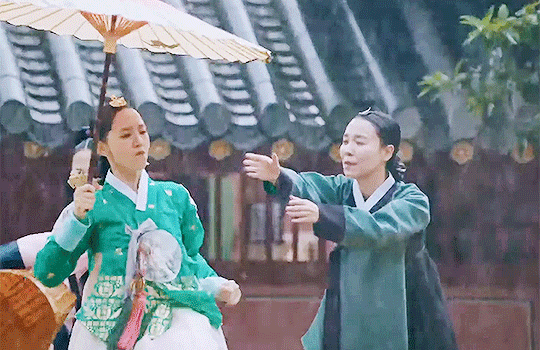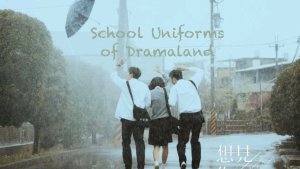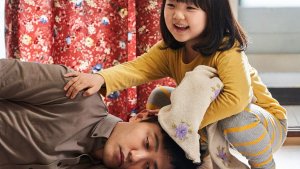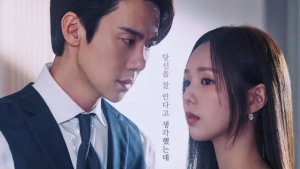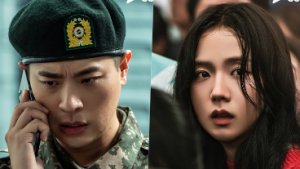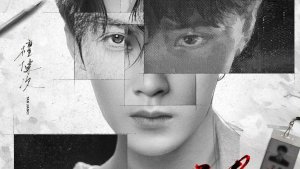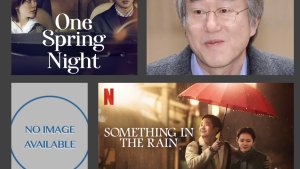 Screenwriter-Director Pairings: Kim Eun and Ahn Pan Seok
Screenwriter-Director Pairings: Kim Eun and Ahn Pan Seok
Cross-dressing is a recurring theme in many K-dramas. In the following editorial, I review some of them while briefly analyzing them from a gender and equality point of view. There is this unsettling feeling I get every time someone, ok not someone, whenever a man dresses up as a woman on western tv-shows fearing they are about to make one of society's most targeted groups into yet another punchline dehumanizing and miss crediting this group's struggles. So why, oh why would I subject myself to watching Korean dramas where cross-dressing is the main theme?
Before I dig into that I would like to give you a brief explanation about my current understanding of gender, this issue is of course complicated, so please feel free to skip ahead to the drama parts or ask me questions (or Google) if anything is unclear. I have also tried to add links to some of the terms used to make it easier to understand (these are colored blue).
Ok, not anything, but feel free to ask and I will answer to the best of my knowledge.
I believe while many societies will try to make us believe that we are born with a biological gender that is either male or female, also called the gender binary, the decision to divide people into only two categories on the basis of visual genitalia was made by people (called social constructions in academic lingua). People have also decided on assigning each of the two genders a whole set of rules and attributes as gender conventions.
Here is a page from one of my favorite children's books on this subject: (translated by me in the small squares). 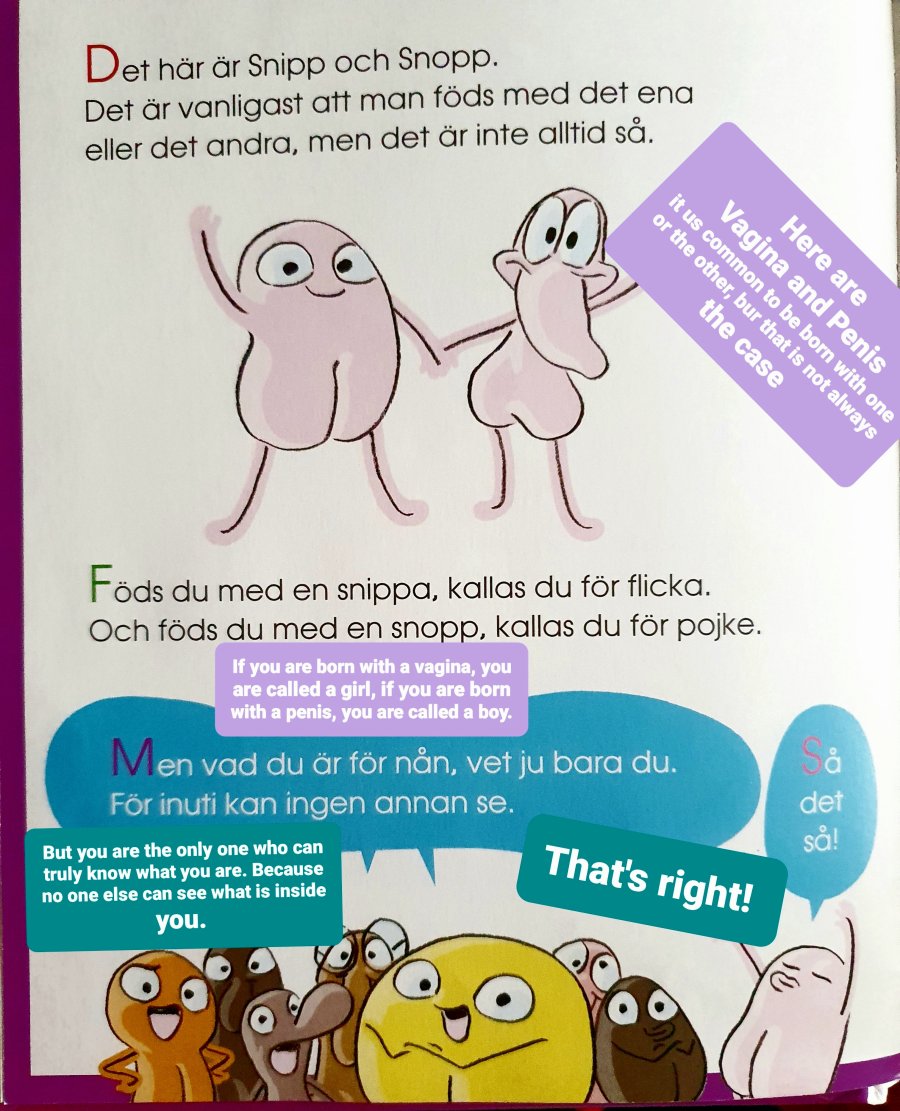 |
While I believe the division and gender roles are all made up. The consequences of this division are very real. Confining people into not only an assigned gender but also to that set of rules, people of all genders are restricted by these conventions making inequality possible.
People who are born with a different gender than the one assigned to them at birth face a whole lot of discrimination, hate crimes as well as have a high rate of suicide and depression. Here is where some Korean dramas come in, though none of the dramas I am about to refer to are about a person who is struggling with their assigned gender, they do play with the concept of gender and not only shed light on the absurdity of being confined/defined by genitalia but also show inequality caused by this division in past and present society.
I could write books and essays (as others have) on this subject but then we would not get to the good stuff, the DRAMAS, which is why you guys are here reading this in the first place! I hope you will enjoy reading about and watching these great dramas!
Historical dramas, shedding a light on both the past and the present inequality!
To know where you are heading you must know your past…. While not all historical dramas are historically accurate they do remind us of where we have been, back in times where the idea of a woman in pants or a satin robe was absurd and a person could be totally unrecognizable by changing their clothes or just letting down their hair.
To fight for justice
In Mr. Sunshine (2018) and Chicago Typewriter (2017), we meet Korea's freedom-fighting women, running around disguised as men. These women used cross-dressing to their advantage. As snipers, they needed the advantage of being able to move around quickly in clothes otherwise assigned to the opposite gender they could easily jump between the genders to disguise themselves and avoid getting caught. Here there is no doubt in my mind that no one is laughing seeing it is a woman dressed as a man. Most people probably interpret these women as badass rather than laughing stocks. A clear consequence of the concept of trading up versus trading down - society valuing all things masculine higher than all things feminine. This also shows viewers that while gender may just be imaginary once you dare to break it you can do a lot more than if you let it define you. Shows most definitely do a great job in kicking those gender roles right where they should be kicked (use your imagination). Both Chicago Typewriter and Mr. Sunshine are action-filled emotional rides. While Chicago Typewriter is slightly lighter than Mr. Sunshine, Mr. Sunshine is more realistic but both brought tears to my eyes so do make sure to have tissues if you chose to watch one of these.
Ryu Soo Hyun (Im Soo Jung) in Chicago Typewriter
Go Ae Shin (Kim Tae Ri) in Mr. Sunshine
To protect oneself
This also falls under the caption as a disguise. In Love in the Moonlight (2016) Hong Ra On (Kim Yoo Jung) is in hiding and therefore needs to disguise herself as a man she named Hong Sam. One night she is sold off to the palace as a eunuch, using her wits she manages to get into the palace and even ends up serving the crown prince who of course falls deeply in love with her. I do not know if the viewers are meant to think "but she is a girl so it is okay" or "gooo pansexuals, love beyond gender!". But seeing this is a very common trope I must say that the risk for homophobia in this is big so please try to remember that pansexuals and bisexuals exist while watching. Here the misunderstanding caused by gender does tend to have some comedy in it but as I see it the focus is more on how to avoid getting caught rather than laughing at the woman dressed as a man. The drama also shows Hong Ra On as a very competent human being making this drama a pretty enjoyable watch.
The Tale of Nokdu (2019) has one of a few portrayals of a man who dresses as a woman but it also has a woman who dresses as a man. Dong Dong Joo (Kim So Hyun) dresses as a man to be able to walk the streets more freely as well as jumps between gender expressions as a disguise to be able to kill some guy... Ok, not just some guy but an evil guy. Her character is definitely badass not only jumping between genders but making some pretty bold moves.
Jang Dong Yoon does an amazing job playing Jeon Nok Du who is forced into hiding when he stumbles across the opportunity to take on the identity of Lady Kim; a widow who wants to elope with her loved one instead of being doomed to live as an outcast in a village for widowed women. He saves her (the real Lady Kim), and he gets her identity (nobody notices she is missing). A so-called win-win situation for the two. giving him the perfect place to hide and giving us a pretty interesting story to watch
I did not feel at any moment that this drama used cross-dressing as a punchline nor did it have the love beyond gender theme to it that many others have. Instead, it showed off quite a lot of powerful women who had been tossed aside by an extremely condemning and unequal society. Yet these women did not let society get to them and fought back by any means available (including crossdressing). Playing quite a bit with gender roles tossing them right out into the ground deeming them only useful as a disguise. This is done with great humor and some pretty cool fight scenes and amazing cinematography.
Historical and Modern-Day dramas use Cross-dressing Theme Similarly
Be it hiding from family, supporting one's family, or fighting for your dream, the idea is similar but the clothes, the risks, and the technology are very, very different.
Much like Jeon Nok Du , Ji Seung Yun (Go Eun Ah) in K-POP - The Ultimate Audition (2012) also uses crossdressing to hide. Though not as dramatic as for Jeon Nok Du, Ji Seung Yun is a modern-day fighter, hiding from her family's controlling eye to be able to pursue her dream as a hip-hop idol. She auditions for a k-pop group dressed as a man. This drama has the whole questioning one's sexuality theme to it that does not always feel right but reflects well on society. Showing both characters struggle with the idea of men falling in love with men.... even though they are technically a man who identifies as a man and a woman who is only playing the role of a man but identifies as a heterosexual woman. A bit confusing and leaves a bad aftertaste of it was okay since they actually were of the opposite sex... but other than that it seems to focus on the characters' interactions and misunderstandings. Showing people willing to go to extreme lengths to achieve their dreams, as well as showing us yet again that gender should not matter. They may also be playing with the idea that many K-pop idols have feminine traits. All in all an okay drama for those who enjoy idol and music-themed dramas.
To support my family
In Sungkyunkwan Scandal (2010) we meet Kim Yun Hee (Park Min Young) a woman who is the daughter of a dead scholar. The father's knowledge made it possible for her as a girl to learn how to read and write at a young age. Now living with her sick brother and mother she is forced to take on her brother's identity to be able to support her family. If this is not criticism towards the struggles of women and the poor I do not know what is. This drama also has the occasional I’m in love with a boy am I gay twist to it, making me feel a bit uneasy. While I am a firm believer in sexuality as a spectrum it would be ignorant of me to think that the idea of a man questioning his sexuality during the Joseon era would be all smooth (actually, I have no clue on how heteronormative Joseon society was). Besides the cross-dressing woman, this drama also shows very different ways to be a man seeing the men in this drama have both warm feminine traits embodied in Song Joong Ki's character Goo Yong Ha, and a bit wilder embodied Moon Jae Shin (Yoo Ah In) and a lovely smart cold and rational way of being a man in Lee Sun Joon (Park Yoo Chun). This drama is not only filled with great actors it is definitely packed with both humor and scenes that make you think about struggles of the past as well as society, a must-watch on my list, just writing this makes me want to watch it again.
In Coffee Prince (2007), much like Sungkyunkwan Scandal, the breadwinner of the family is more successful at making money as a boy than as a girl. Besides being modern-day, while Kim Yun Hee intentionally dresses as a man, Go Eun Chan (Yoon Eun Hye) just happens to be a tomboy, to begin with, and is unintentionally mistaken as a boy. Being given a job opportunity only offered to boys she finds herself lying and crossdressing as a man. Trouble arrives when she falls in love but it seems to be more of a problem to her than to the person she loves. Showing a pretty obvious but unspoken portrayal of love that goes beyond gender. Choi Han Gyul (Gong Yoo ) loves her no matter how she dresses or what gender expression she uses. The drama also has some interesting side stories, a lot of humor with a side of seriousness to go with the fun. Making it both enjoyable and easy to watch.
In You're Beautiful (2009) they use a story about twins to play with gender. Mi Nyeo (Park Shin Hye) crossdresses to help her identical twin brother. Identical in every way but genitalia (and personality) to achieve his dreams while he is otherwise occupied. This of course works pretty well until love strikes yet again and the question "am I gay?" arrives. Here, unlike Coffee Prince more like Sungkyunkwan Scandal and K-POP - The Ultimate Audition sexuality seems to be a problem. Acknowledging that we live in a world where anything but heterosexuality is complicated, this drama does get you thinking about the nature of love and sexuality. Is this man who has fallen for another person he thinks is a man pan or bisexual or does the fact that it is important for him that the person he falls for is a woman make him heterosexual? Watching this with a critical eye makes it a very interesting drama to watch (+ lots of fun music and idol love plot).
K-dramas Play with Gender by Using Supernatural Powers...
Delivering the Theme: Because I woke up like this!
In Mr. Queen (2020), Jang Bong Hwan a modern-day manly chef wakes up in Kim So Yong's, the Queen of Joseon, body (Shin Hae Sun). This drama seems to say to me forget gender, if a man found himself in the body of a woman several hundred years before his time the biggest issue would be the difference in time and not his gender identity or sexuality for that matter. Making this drama is not only interesting from a gender point of view but interesting from an understanding of the evolution of society and history. It may not be an accurate portrayal of history but the essence is there. It puts gender in the context of the ever-evolving social construction not only constructing gender roles but also conventions for society not only in time but also in different layers of society. This drama is hilarious to watch and has one of my all-time favorite scenes:
In Secret Garden (2010), both the leads wake up in a body belonging to the opposite sex. Much more focus is put on the differences between genders, but here too the message seems to end up showing that most differences are society-made and not biological. Seeing the female lead is portrayed as stronger and more athletic than the male lead. I cannot help but wonder if the makers of this drama actually wanted to tell us to stop focusing on gender and just be ourselves. So if you can look past some awkward scenes in the beginning this is fun to watch rich man poor woman, supernatural, hate to love, Melo, rom-com, drama (try to say that in-breath).
Not Part of the Main Story but Present
There are dramas that incorporate elements of cross-dressing without it being part of the main plotline. These are the dramas where crossdressing has the biggest risk of becoming a punchline but if done right it can actually show great representation as well as highlight the inequality people who crossdress risk facing.
Blurred plot lines-representation or punchline
There are a few dramas where it gets a bit blurry, one of my all-time favorite dramas is Strong Woman Do Bong Soon (2017) but I find myself conflicted every time I see Oh Dol Pyu (Kim Won Hae), this character is accepted the way they are, wearing very feminine traits and a bit over the top, this is part of the comedy of the show. But still, in the context of the whole show, I find myself embracing this character seeing their other half is the exact opposite of the stereotype and both characters blend in naturally in the plot. These characters are shown as complex human beings with emotions and character growth. They are not subjected to hate and discrimination but are seen as a completely natural couple. Just the way I wish society was. Making me wonder if this is a punchline or if it this representation disguised as a punchline for the mainstream eye?
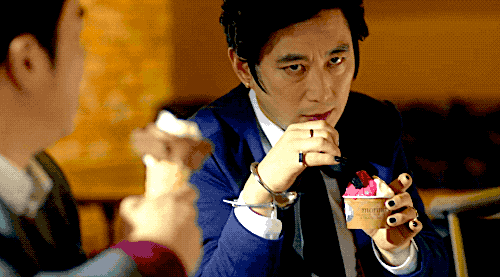
In Mad for Each Other (2021) we meet the cross-dresser Samantha (Ahn Woo Yeon) who is subjected to being treated like a pervert for wearing clothing assigned to women. Here the cross-dressing is used to convey a message rather than a punchline (though they do seem to walk a thin line there), showing how society tries to shove people into boxes and fear all that try to break loose.
Weightlifting Fairy Kim Bok Joo (2016) and Strongest Deliveryman (2017) are AMAZING dramas with great messages overall and a lot of good humor and fluffy romance. So why, oh why did they have to add a scene where men wear women's cheerleading clothes and makeup (clothes have no gender but by society normally seen as belonging to women) purely for entertainment. I find it hard to find a different explanation than that of them being there as unnecessary punchlines. I also find it hard to see the point of having these scenes there since they do not add anything to the plot but would love to hear more explanations for this if you have any.
To Sum It Up...
As you may understand I find this issue very interesting. I find myself learning more and more about it as the days pass by. What I once thought was clear has become more and more complex. I wonder if this article increased your understanding of gender or if it just made you more confused (if so I'm sorry, but welcome to the club). Cross-dressing truly does have the potential to shed light on society's inequalities. When done well these dramas can be nothing but brilliant and progressive. I cannot help but wonder if this is as close as we can get to showing gender non-conforming behaviour on-screen in today's mainstream society (of course this may differ globally).
Unfortunately, it is still easy to find men in women's clothing as a punch-down punchline so my request to you is to keep watching and enjoy dramas while staying alert. I am not telling you not to laugh, laughter is great medicine for dealing with life's misfortunes and inequality. I am actually a strong advocate for laughing at life's inequalities. However, there is humor that punches upwards and there is humor that punches downwards. Pointing your laughter towards the oppressors instead of at the oppressed so-called punch up instead of down humor is a lot more fun! I may be naive but I think that watching dramas with this awareness is a lot better than watching them without it, reminding you that men in dresses are perfectly legit (not a laughing stock), so why not remind others of that too.
As an added bonus, last but not least of the men in dresses I would like to mention Jung Hae In in The Three Musketeers (2014) whose cross-dressing baffled me and I would therefore like to ask you for your help. Do you find this funny haha, a man in a dress or do you see a beautiful badass man dressed in a dress?
If you have read this far I hope you enjoyed this article, I would love to read your thoughts about this article as a whole as well as about the issues it addresses. If anything is unclear please do not be afraid to ask, I love answering questions, as long as they are respectful. I can't help but wonder if you have a favorite drama where crossdressing is part of the theme? And would love to know how you wish dramas portrayed crossdressing.
Edited by: Nymphadora (1st editor), BrightestStar (2nd editor)

